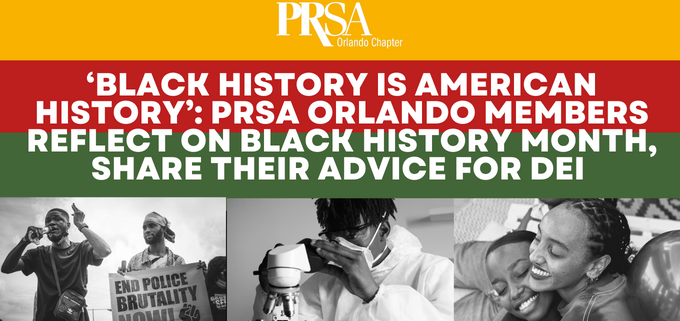‘Black History is American History’: PRSA Orlando Members Reflect on Black History Month, Share Their Advice for DEI
By: Jazmyn Reed
From learning how to embrace your DEI spidey-senses to tips on influencing narratives via visual communications, hear from several of our Black members on why Black History Month is the perfect opportunity to celebrate the rich history, culture, and contributions of Black people while learning, growing, and working towards a more inclusive and equitable future. This month– and beyond February 28.
What does Black History Month mean to you?
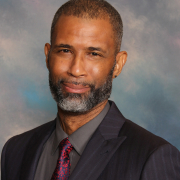 “Black History Month provides an the opportunity to consider and reconcile intentionally the fact that, in its 400-year sweep, the history of blacks in America is a crazy quilt of shackled misery, leashed progress, and unchained glory. It is the history of us. “Us,” meaning, us Americans. We can’t pull on the thread of black history in the United States without unraveling the fabric of our nation.”
“Black History Month provides an the opportunity to consider and reconcile intentionally the fact that, in its 400-year sweep, the history of blacks in America is a crazy quilt of shackled misery, leashed progress, and unchained glory. It is the history of us. “Us,” meaning, us Americans. We can’t pull on the thread of black history in the United States without unraveling the fabric of our nation.”
- Darryl E. Owens
Associate Vice President, Communications and Engagement, Beacon College
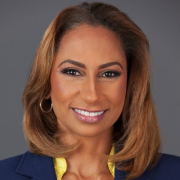
“Black History Month is a time for me to reflect and honor the fearless, resilient, courageous, beautiful, strong, and determined Black Women and Men who have inspired me and shaped who I am today. Importantly, it is a time for all of us to celebrate our Black heritage and the impact of our significant contributions to culture and history – because Black history is American history.”
- Eryka Washington Perry
Director of Communications & Diversity, Equity & Inclusion Ambassador, Reedy Creek Improvement District
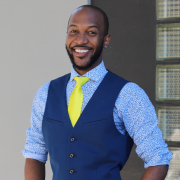
“First thing’s first–Black history is 365 days a year. Having said that, Black History Month, for me, means a celebration of the culture and the phenomenal contributions of Black people to our society. We have overcome a great deal and still continue to soar over everyday obstacles time and time again. This month is a powerful–and essential–reminder that Black history is American history. As a proud Black man, it helps me understand the value of our stories and the impact we continue to make. I’m here for the celebration!”
- Jaylen Christie
Account Supervisor, Bernadette Davis Communications

“Black History Month is a unique time of year in which we assess, reminisce, and appreciate the unique legacy and perseverance of black people as it relates to the history of our great nation. There is so much to be celebrated, so much to be admired, and so much to be honored regarding black stories and contributions here in the United States of America. Black History Month affords our entire country the opportunity to collectively express the gratitude owed to black people who have helped facilitate a more equal, progressive union, ensuring that America remains as the land of opportunity. “
- Nicolette Sewell
Assistant Marketing & Communications Manager, Orange County Convention Center

“Black History Month is a reminder that Black Americans have meaningfully impacted the country and the world. It reassures me to be resilientand make my mark on an industry where I am underrepresented. As a professional communicator, I think of Black History Month as an awareness campaign, which has and still is contributing to what I believe is mainstream America’s shift towards a more realistic and accurately depicted, diverse and inclusive American identity.”
- Tyrone Law
Public Relations Specialist, Zillow
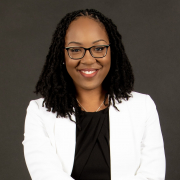
“Black History Month is about legacy, excellence and impact. It is a moment to not only reflect on our rich history but also elevate the stories that make Black history worthy of celebration year round.”
- Wendy J. Roundtree, APR
Founder & Lead Strategist, Jarel Communications
According to a recent report from Bloomberg, DEI jobs have been significantly impacted by big tech layoffs and DEI job listings were down 19% in 2022. How can communication leaders advocate for DEI and representation this month and beyond?
“Communication leaders can advocate for DEI and representation this month and beyond by using our growing influence at the table to help decision-makers find their voices to help move the dialogue beyond stating to stakeholders that DEI is important and pivot into clearly explaining why it is important holistically in promoting a more inclusive and equitable work culture.”
- Darryl E. Owens
Associate Vice President, Communications and Engagement, Beacon College
“Unfortunately, many of the declarations made by corporations back in 2020 concerning their commitment to diversity were lies. It’s not remotely surprising to me that DEI jobs are disappearing. After the murder of George Floyd, DEI became a trendy topic. I believe as communications practitioners we can and should effectively challenge companies to honor their commitments. Ethics may be an important factor here. In the event that a DEI position is eliminated at a company, I think a DEI task force should be put in place to ensure everyone feels their voices are heard and that they have a seat at the table.”
- Jaylen Christie
Account Supervisor, Bernadette Davis Communications
“The way we approach employee attraction and retention has changed dramatically since the pandemic. More and more we see candidates and employees choosing to work for or stay with employers whose values align with their own. Diversity, inclusion, and belonging have become table stakes and companies will continue to be challenged for talent if they do not have a clear, authentic approach to DEI. As communicators, we have an obligation to ensure our companies understand the value of DEI to successful organizations and our leaders can clearly communicate our values to internal associates, customers, and stakeholders. These conversations must happen every day and be woven into the communications plan.”
- Eryka Washington Perry
Director of Communications & Diversity, Equity & Inclusion Ambassador, Reedy Creek Improvement District
“Opportunity & Accountability. We’re not always able to control the decisions of others, especially in the workplace. We’re only able to dictate our own actions. So, when given the chance, I 100% believe in advocating for diversity, equity, and inclusion no matter how big or small the gesture is. I say it all the time…if you are in a position to influence narratives via graphics at your organization, take that opportunity and use images featuring black families or professionals, interracial couples & groups of friends. Use graphics that normalize LGBTQ+ representation amongst racially marginalized groups. Even a simple gesture like sending a job post to a friend for a new role you think they’d be a good fit for or passing their resume on to a colleague who may know a hiring manager. Also, something we can all do regardless of our positions or career paths—conduct graceful, educated conversations. Join your local professional networking organizations. Mingle with people who look like you and the ones who don’t. Take accountability and build that diverse comradery in your personal and professional friend groups. When the opportunity comes, be open to having graceful conversations about various perspectives, not to force ideas or ways of life, but rather to educate and inform. In all things, conduct your life in a way that displays respect and compassion for both the diverse communities around you and the future of those coming up after you.”
- Nicolette Sewell
Assistant Marketing & Communications Manager, Orange County Convention Center
“Speak up! Remember that your organization hired you for a reason. If your ’Spidey-Senses’ are going off as it relates to gaps or opportunities to loop in more inclusive proactive messaging and initiatives into overall strategy, make sure you at the very least call it out and make suggestions. At this point, it’s undeniable that it will impact the bottom line. Sometimes folks will listen and sometimes they will not but challenging the status quo and bringing in your unique perspective and insight could add a ton of value to your organization.
Try to tie it back to the bottom line and business goals. Although we would like companies and organizations to do the right thing, I always try to remember that in America if it’s not an economic conversation, then it’s not an American conversation, so a good way to grab the attention of leaders is to make a real connection to how it will impact overarching business goals and profits.”
- Tyrone Law
Public Relations Specialist, Zillow
“As the conscience of the organizations we represent, it’s up to us to hold them accountable, call out performative tactics and guide them on what representation looks like when it’s woven into company culture.”
- Wendy J. Roundtree, APR
Founder & Lead Strategist, Jarel Communications

